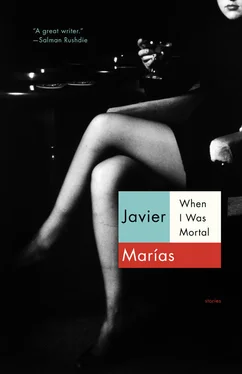“What’s wrong?” said my wife feebly.
I turned round, she was sitting up in bed, with frightened eyes, the eyes of a sick person who wakes and cannot see anything and doesn’t yet know where she is or why she feels so confused. The light was off. At that moment, she was a sick woman.
“It’s nothing, go back to sleep,” I said.
But I didn’t walk over to her to stroke her hair or calm her down, as I would have done in any other circumstances, because I couldn’t leave the balcony, or even take my eyes off that woman who was convinced she had arranged to meet me. Now she could see me clearly, and I was obviously the person with whom she had made an important date, the person who had caused her to suffer by making her wait and who had offended her with my prolonged absence. “Didn’t you notice I’d been waiting for you here for an hour? Why didn’t you say something?” she was yelling furiously now, standing outside my hotel, beneath my balcony. “Do you hear me, I’m going to kill you!” she shouted. And again she made the gesture with her arm and her fingers, the grasping gesture.
“What on earth’s going on?” asked my wife again, lying dazed on the bed.
At that moment, I stepped back and pulled the balcony shutters to, but not before seeing that the woman in the street, with her enormous, old-fashioned handbag and her stiletto heels and her strong legs and her stumbling walk, was disappearing from my field of vision because she was entering the hotel, ready to come up and find me and meet me. I felt empty inside when I thought about what I could possibly say to my sick wife to explain the interruption that was about to take place. We were on our honeymoon and on honeymoon you really don’t want the interference of a stranger, although I was not, I think, a stranger to the person now coming up the stairs. I felt empty inside and I closed the balcony shutters. I prepared myself to open the door.
For Mercedes López-Ballesteros, in San Sebastian
ON PALM SUNDAY, almost all my friends had left Madrid, and so I went to spend the afternoon at the races. In the second race, which was not particularly interesting, a man to my left inadvertently jolted my elbow as he abruptly raised his binoculars to his eyes in order to get a better view of the final straight. I was already looking, I already had my binoculars before my eyes, and the sudden blow made me drop them (I always forget to hang them round my neck, and that’s how I pay for it or how I paid on that day, because one of the lenses cracked, the binoculars hit the steps, they didn’t bounce, they just lay there on the ground, still and broken). The man crouched down before I could pick them up, he was the one who first noticed the damage, apologizing as he did so.
“Sorry,” he said. And then: “Oh no, what bad luck, they’re broken.”
I saw him crouched at my feet and the first thing I noticed was that he was wearing cufflinks, a rare sight nowadays, only the very vulgar or the very ancient dare wear them. The second thing I noticed was that he had a gun in a holster strapped to his right side (he must have been left-handed), as he bent down his jacket gaped open at the back and I saw the butt of the gun. Now that’s an even rarer sight, he must be a policeman, I thought. Then, as he got up, I realized that he was a very tall man, a whole head taller than me; he must have been about thirty and he had sideburns, straight but much too long, another old-fashioned touch, I wouldn’t have noticed them fifteen or even a hundred years ago. Perhaps he wore them to frame and add volume to his head, which was long and rather small, he looked like a matchstick.
“I’ll pay for any repairs,” he said, embarrassed. “Here, I’ll lend you mine for the moment. It’s only the second race.”
The second race had, in fact, finished. We didn’t know who had won, so I didn’t dare tear up my betting slips, which I held in my hand as we all do, only to tear them up and immediately throw them to the ground if we’ve lost, and thus instantly forget our mistaken forecast. At that moment, I was also holding my broken binoculars (I’d bought them on a plane not long before, in mid-flight) as well as the other man’s undamaged ones, he had handed them to me at the same time as he had announced that they were mine to borrow, I had taken them mechanically so that they too did not crash onto the steps. When he saw that I had my hands full, he relieved me of the betting slips and put them in the breast pocket of my jacket and gave it a little pat, as if to say that they were now in safekeeping.
“But if you give me yours, what are you going to do?” I said.
“We can share them, if you don’t mind us watching the races together,” he said. “Are you on your own?”
“Yes, I am.”
“The only thing is,” the man added, “we’d have to watch all the races from here. I’m on surveillance duty, and this is my post today. I can’t move from here.”
“Are you a policeman?”
“Bloody hell, no, I’d starve. I know a few though. Besides, do you think I could dress the way I do if I was a policeman? Look at me.”
And as he said that, the man stretched out his arms and took a step back, his hands outspread as if he were a magician. The fact is that (to my taste) he was extremely badly, albeit expensively, dressed: a double-breasted suit (but with the jacket open, as I said) in an unlikely greenish-grey colour, undoubtedly difficult to find; the shirt, which seemed overly starched for the times, was, I fear, wine, not an ugly colour in itself, but inappropriate in such a tall man; his tie was an incomprehensible swarm (birds, insects, repellent Mirós, cats’ eyes), in which the predominant colour was yellow; the oddest thing were his shoes: they weren’t lace-ups or moccasins, they were like children’s ankle-high bootees, he must have thought them very modern, and the rest he would imagine was semi-classic. His cufflinks weren’t too bad, possibly by Durán, very shiny and in the shape of a leaf. He was not a discreet man, nor original, he had simply never been taught how to coordinate his clothes.
“I see,” I said, not knowing what to say. “So what have you got to watch?”
“I’m a bodyguard,” he said.
“Oh, and who are you guarding?”
The man took the binoculars that he had just lent me and peered through them at the grandstand which was a short distance away (you didn’t really need magnifying lenses to see it). He handed them back to me. He seemed relieved.
“He hasn’t arrived yet, there’s still time. If he does come, he won’t get here until the fourth race, to say hello to his friends. Like everyone else, he’s only really interested in the fifth race, and he can’t waste a moment, I mean, you probably came early just to pass the time. He, on the other hand, will be doing deals over the phone or taking a nap so as to have a clear head. I came early, just to see how things are going this afternoon, to check that things aren’t getting heavy here and to take any necessary steps.”
“Heavy? What do you mean? What could possibly happen here?”
“Probably nothing, but someone always has to go on ahead. And someone else stays behind with him, of course. I’m usually the one who goes on ahead. For example, if we’re going to a restaurant or a casino, or we stop to have a beer at a roadside bar, I always go in first to see the way the land lies. You never know when you go into a public place, two guys might be beating the hell out of each other at that very moment. It doesn’t happen very often, but you never know, a waiter might have spilled some wine, and an awkward customer might be giving him a hard time. I wouldn’t want my boss to see that or have him mixed up in a mess like that. Before you know it, bottles are flying. During the day a lot more bottles go flying about in Madrid than you might imagine, knives come out, people hit each other, people can be very thin-skinned. And if, in the middle of all this, someone with a bit of money turns up, then everyone stops and thinks: ‘Let the rich man pay.’ The ones doing the fighting are quite capable of coming to some instant agreement and laying into the man with the dosh: ‘To hell with the rich.’ You have to keep a very sharp eye out.”
Читать дальше












